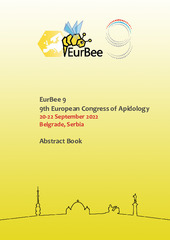Приказ основних података о документу
Expression of protease in adult honey bees fed with different patties
| dc.creator | Pavlović, Ratko | |
| dc.creator | Dojnov, Biljana | |
| dc.creator | Šokarda Slavić, Marinela | |
| dc.creator | Pavlović, Marija | |
| dc.creator | Tomić, Nevena | |
| dc.creator | Mišić, Milan | |
| dc.creator | Vujčić, Zoran | |
| dc.date.accessioned | 2023-03-03T13:23:31Z | |
| dc.date.available | 2023-03-03T13:23:31Z | |
| dc.date.issued | 2022 | |
| dc.identifier.isbn | 978-86-7078-173-3 | |
| dc.identifier.uri | https://cer.ihtm.bg.ac.rs/handle/123456789/5885 | |
| dc.description.abstract | Feeding of honey bee (Apis mellifera) is a challenge for beekeepers and formulation of food supplements is improved continuously. When natural food sources are scarce or not available, supplemental foods are widely used to support and build up honey bee colonies. Influence of commercial (sugar) patty and the patties enriched with 12.5% pollen and 12.5% dried yeast on protease expression in honey bee adults is presented. This is part of a wider study aimed to compare the expression of digestive enzymes using different patties. Data collected in this study can be useful for development of higher quality of food supplements for honey bees. Honey bees were kept in an incubator for 21 days, at a temperature of 35°C and at 80% humidity. In each cage there were one hundred bees and a piece of honeycomb. Midgut samples were taken after 7, 14 and 21 days, homogenized and analyzed for protein concentration and protease activity. The highest protein concentration was detected in the midgut of pollen fed bees, and lowest in commercial patty fed group, determined by the Bradford method. Protease activity was the highest in bee’s midgut fed with pollen patties, and the lowest in bees fed commercial patties which is shown by enzyme assay and by zymograms. There were different protease isoforms present in bees fed pollen, yeast and commercial patties, but the major isoforms were the same. The observed decrease in protease activity over time in all groups is probably due to the transition to foraging tasks. Reduced protease activity in the gut of bees fed commercial patties is due to a lack of proteins or some other inducers present in food. Because pollen is honey bee natural food, we conclude that food supplements that induce similar enzyme expression as pollen (dried yeast) can be considered as appropriate food substitution, because it is superior to supplements which induce very different enzyme expression. | sr |
| dc.language.iso | en | sr |
| dc.publisher | University of Belgrade – Faculty of Biology | sr |
| dc.relation | info:eu-repo/grantAgreement/MESTD/inst-2020/200026/RS// | sr |
| dc.relation | info:eu-repo/grantAgreement/MESTD/inst-2020/200168/RS// | sr |
| dc.rights | openAccess | sr |
| dc.rights.uri | https://creativecommons.org/licenses/by/4.0/ | |
| dc.source | Abstract Book - 9th European Congress of Apidology - EurBee 9, September 20-22, 2022, Belgrade, Serbia | sr |
| dc.subject | protease | sr |
| dc.subject | honey bee | sr |
| dc.subject | nutrition | sr |
| dc.title | Expression of protease in adult honey bees fed with different patties | sr |
| dc.type | conferenceObject | sr |
| dc.rights.license | BY | sr |
| dc.citation.spage | 172 | |
| dc.description.other | Abstract book: [https://doi.org/10.5281/zenodo.7239012] | sr |
| dc.identifier.rcub | https://hdl.handle.net/21.15107/rcub_cer_5885 | |
| dc.identifier.fulltext | http://cer.ihtm.bg.ac.rs/bitstream/id/24437/bitstream_24437.pdf | |
| dc.type.version | publishedVersion | sr |


